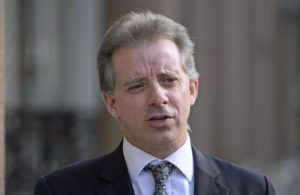by WorldTribune Staff, April 27, 2017
The British author of the so-called “Trump dossier” involving alleged ties with Russia has admitted that much of the document’s information is unverified.
Christopher Steele, the former British spy who wrote the 35-page dossier, said that charges his sources made about a tech company CEO and Democratic Party hacking is unverified, Rowan Scarborough reported for The Washington Times on April 25.

Related: Who is Christopher Steele? Opposition research firm paid author of fictional Trump dossier, April 25, 2017
In a court filing in London, Steele also said his accusations against Trump and his aides about a supposed Russian hacking conspiracy, which has been used as leverage by Democrats to call for investigations into President Donald Trump’s alleged collusion with Russia, were never supposed to be made public.
A defamation lawsuit has been brought against Steele by Aleksej Gubarev, chief executive of the network solutions firm XBT Holdings.
Steele admitted that the part of the dossier that identified Gubarev as a rogue hacker came from “unsolicited intelligence” and “raw intelligence” that “needed to be analyzed and further investigated/verified.”
According to Scarborough’s report “Steele’s court filing portrays him as a victim of Fusion GPS — the Washington firm that hired him with money from a Hillary Clinton backer.”
Steele, who has not spoken publicly about the dossier, said through his attorneys that “the defendants did not provide any of the pre-election memoranda to media organizations or journalists. Nor did they authorize anyone to do so. Nor did they provide the confidential December memorandum to media organizations or journalists. Nor did they authorize anyone to do so.”
“At all material times Fusion was subject to an obligation not to disclose to third parties confidential intelligence material provided.”
Steele also says the ultimate responsibility lies with BuzzFeed, which posted the entire dossier on Jan. 10 even though its editor said he doubted the document’s accusations were true.
